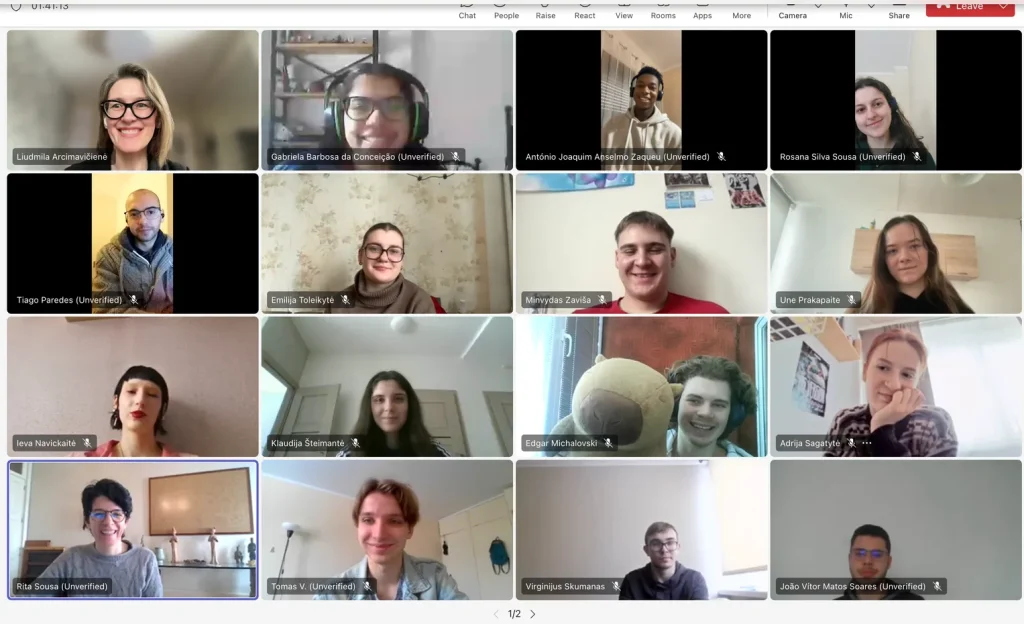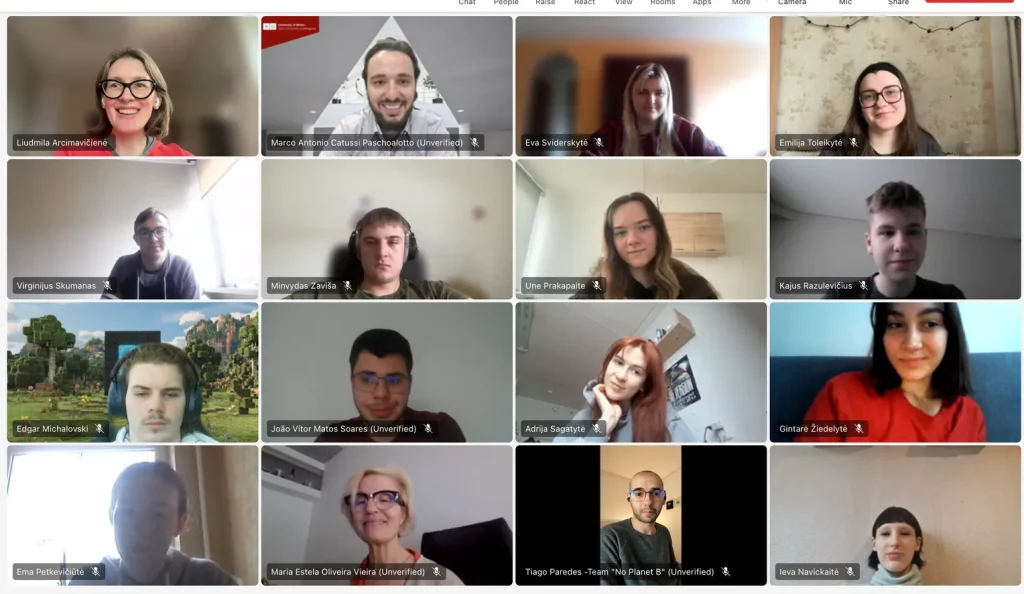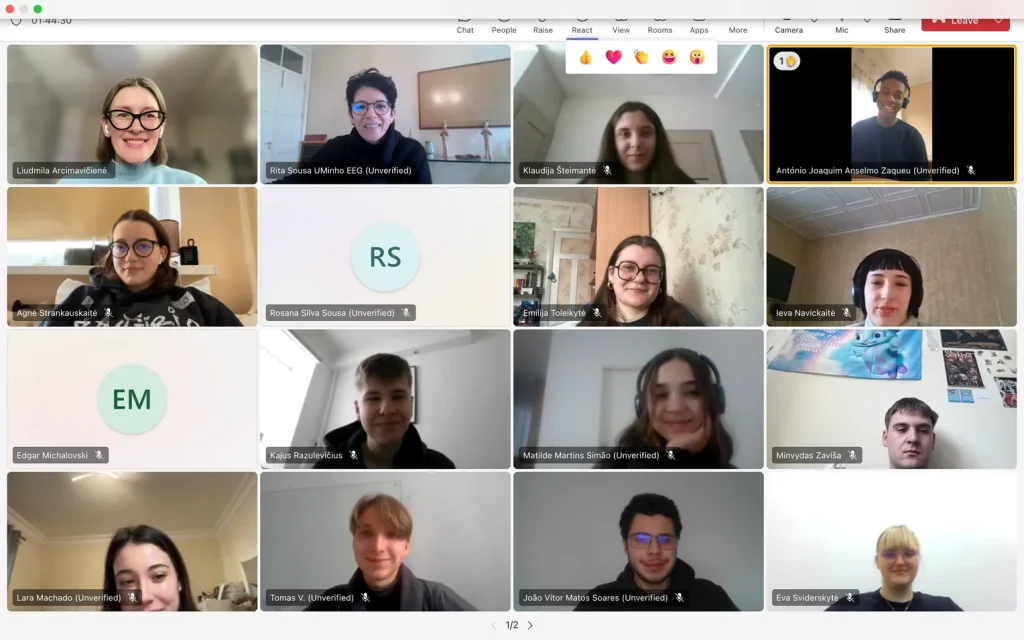Arqus Global Connect, training programme on COIL methodology
|
11 Jul 2025Arqus Global Connect is an initiative financed by the Arqus Innovation Fund, which has developed a training programme centred on the teaching methodology COIL (Collaborative Online International Learning).
Get to know this bottom-up initiative with this interview with the Arqus Global Connect coordinator, Marcela Maldonado Clavijo, from the University of Granada; as well as participating professors: Lidumila Arcimavičienė (Vilnius University), Luisa Delgado Márquez (University of Granada), Joanna Grzyb (University of Wrocław) and Rita Sousa (University of Minho).
The goals of this initiative were:

COIL is defined as a teaching and learning methodology that promotes the development of intercultural competences in the students who experience it, however, and from my experience, beyond that, COIL is a dynamic that not only allows intercultural and global learning, but also promotes spaces for collaboration, interaction and knowledge between people from different cultures, and when I say people I mean that not only students are protagonists of this process, although it is centred on them, teachers and university staff also play an important role in its implementation and develop interpersonal, intercultural and transversal skills that allow them to be global professionals and citizens of the world.
The most important and scientifically proven benefits include the development of soft skills, intercultural communication skills and interpersonal abilities inherent in interactions between cultures. However, I would also argue that it fosters values, raises awareness of human diversity, highlights global issues and encourages reflection on our local and global environments. In the current global context, it is particularly important that it enables us to empathise with others, understand their context, thinking and way of life. This is a valuable achievement in the internationalisation of the curriculum, which is often difficult to understand, implement and value in higher education institutions as a path towards global education.
We have progressed 90% of our initiative. We are currently in the evaluation and improvement phase, during which we will develop our final session. In this phase, we hope to collect not only the positive and noteworthy aspects but also those that we have not yet achieved.
Throughout the initiative, 54 people participated, including students, faculty, and staff, from the four universities that make up the initiative
I think we faced many challenges in our different roles. However, in my role as coordinator, the greatest challenge I faced was bringing together all the members of the initiative in a single space and on the same page. Even though they are academics and staff from one of the Arqus universities, it remains challenging to develop a shared vision of a network, an alliance, and working together toward a common goal. However, this is also part of the challenges that those of us who work in COIL management commonly face daily.
The language was absolutely challenging. I didn’t see it as an obstacle; I embraced it as a challenge I had to overcome, not only because of my language proficiency, but also because of the need to communicate, simply, effectively, and with everyone involved in the initiative.
I also believe that involving the teaching staff was a challenge, as showing them the importance of their role in the internationalisation of the curriculum, the need we have as universities to train them in these issues, and the importance of making progress in them is not easy, due to the resistance we encounter when it comes to pedagogical innovation, what it means to learn new teaching and learning methodologies and what this entails, which ultimately means transforming our pedagogical practices, a very complex result to achieve if the teacher does not recognize this need from the outset and is not convinced of it.
I believe that the impact of Arqus Global Connect has been especially significant on the interpersonal skills of the participants. They recognize abilities they thought they lacked, understand the complexity of interacting with people who have different perspectives, and see the importance of creating learning spaces and situations where students can learn not only academic content but also develop transversal skills like critical thinking, communication, tolerance, flexibility, and collaboration toward a common goal. I think we all learned something in common and with equal importance: flexibility and conflict resolution. I believe these were the two main lessons from this experience.

The funding received has definitely been essential. Developing this type of initiative, although they do not require face-to-face development because their essence is virtuality and the use of technologies, virtual exchange initiatives such as COIL also require a budget and recognition, as most internationalisation initiatives have. This funding helped us not only to cover logistical expenses but also training, incentives, and, of course, the quality of its development. This allowed us to co-participate with the participation of international collaborators, experts, and international organisations leading on this subject and thus build a high-quality training programme.
The next steps, if we are ambitious, could be several, including thinking about this becoming an initiative in which the 9 universities of the alliance participate, an ideal achievement, but for the moment, we want to collect the experiences we have lived and disseminate with the alliance and disseminate with the alliance what we have learned and the future collaborations that could be developed through this methodology to strengthen and position the internationalisation of the curriculum within the alliance and enhance the academic collaborations between the universities of the alliance.
Lidumila: It has positively transformed my teaching. My teaching has become more engaging, better organised and more collaborative.
Joanna: I found new possibilities to make students more interested in the subject I teach.
Liudmila: It has challenged me in the way that I had to become better with time management and pre-teaching activities. COIL is successful if students get access to a clear set of guidelines. The preparation of guidelines took more time than expected. At the same time, it helped me become more organised and conscious of students’ needs.
Joanna: The challenging part was to persuade students that within the COIL they are experts in their subject, and they shouldn’t be afraid to take an active part in organising their research tasks.
Joanna: The main problem was communication. My students get used to answering within 24 hours, and prolonged time of waiting makes them anxious and afraid that they will not pass” the course. I decided just to encourage my students and assure, that I will accept their part as a full report. I think in the future, there should be some stricter rules for establishing contact rules also.
Liudmila: It has definitely opened new doors for me. I met amazing colleagues from UMinho, whose expertise and teaching skills broadened my understanding of project-based teaching in a cross-cultural environment.
Luisa: It has connected me with colleagues from diverse academic fields, sparking new ideas for future collaborations and potential international teaching projects.
Joanna: I would definitely continue with the COIL, maybe with a broader perspective.

Joanna: A very interesting observation students make during COIL – Polish people really complain more.
Liudmila and Rita: COIL experience dares you to step out of your comfort zone and makes you grow by challenging your perspectives, enhancing your intercultural understanding and strengthening your collaboration skills. Go for it!
Luisa: COIL is an enriching journey that challenges you to rethink teaching, deepen intercultural understanding, and foster meaningful global connections.
Joanna: I still need to learn a lot!
Luisa: The most valuable takeaway was understanding how to integrate intercultural dialogue and collaborative activities, making it possible to envision more globally oriented learning experiences.
Joanna: There are unexpected differences within Europeans.
Joanna: Yes, this is definitely a good, growing experience for students.
Luisa: Yes, because it promotes reflection, inspires pedagogical innovation, and develops critical competencies such as collaboration, intercultural communication, and global awareness.
Joanna: Yes, it helps to broaden perspectives.
Luisa: Keep an open mind, plan well with your partners, and be ready to learn from the experience. It can really help you grow as a teacher and open up new ways of connecting your students with the world.
Joanna: Try to make a good plan and do not be afraid to change it.
Arqus Global Connect is one of many bottom-up inititatives financed by the Arqus Innovation Fund. Learn more about it here.